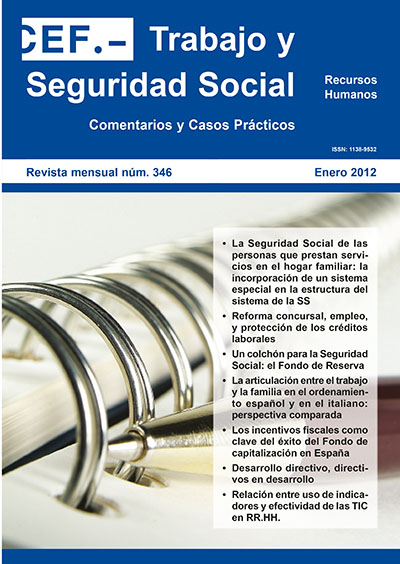Bankruptcy Law reform, employment, and protection of work credits: a right of «bargain» («settlement») or «compensation» («survival»)?
DOI:
https://doi.org/10.51302/rtss.2012.3279Keywords:
insolvency, bankruptcy process, claims, liens, background and judicial regulation of employmentAbstract
Bankruptcy Law (LC) 2003 has not managed to change the use of bankruptcy was being done in Spain in the last 30 years, so that 9 out of 10 end with the liquidation of the debtor's estate, althought the law wanted the normal solution was the preservation of economic activity. Instead, it got left in the background of social issues, dominated by the commercial logic of the regulation performed at the time, with the effect of lack of protection of the rights and interests of the workers concerned. Therefore, the result of a law called to be, in the theoretical formulation of its promulgators, a legal milestone has been, in practice, a sound economic failure with a high social price. In sum, today, almost all of the contests end with the liquidation of the debtor's assets, the cessation of economic activities, failure to pay a large part of the creditors and the dismissal of workers.
Now, the Law 38/2011, of October 10, reforming as a whole, but not radical, the Law 22/2003, LC, want to correct those deficiencies. To do this, start recognizing the serious consequences on employment have contests, so it intends to carry out a reform that greatly improve the protection of workers, this eliminates some of the contradictions of regulation and integrates a significant portion of its legal gap.
Consequently, this study makes a detailed analysis of the new reform, demonstrating its power in a positive-operative, that is, for the subjects involved in the bankruptcy, both in management and in its effects. Following this analysis, it concludes with an overall assessment of the bankruptcy reform, both in general scope and as regards the social and labor level. The conclusion is that reform solves some doubtful questions of current legislation, no doubt. But neither does it with all, or fails to raise new questions nor will, which is far more important, to change the Spanish insolvency experience, which is really what is needed. Perhaps it's time to rethink in a radical sense of bankruptcy, clearly separated from the instruments for the solution, prior to, and outside, tender-on corporate crises through its restructuring.



















